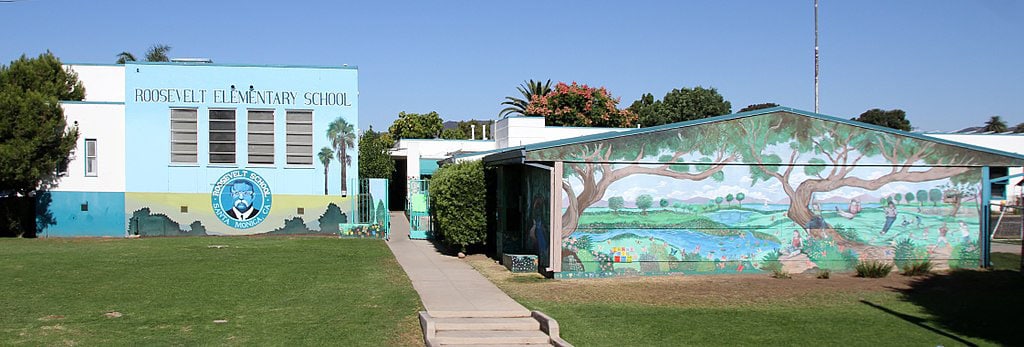 Roosevelt Elementary School in Santa Monica. Tony Hisgett/Wikimedia Commons under the Creative Commons Attribution 2.0 Generic license.
Roosevelt Elementary School in Santa Monica. Tony Hisgett/Wikimedia Commons under the Creative Commons Attribution 2.0 Generic license. The devil went down to Texas last weekend, but on the way, he stopped in Santa Monica.
The hostage crisis in the small Texas town of Colleyville’s only synagogue that captivated a worldwide audience last Saturday was a narrowly-averted tragedy. It was also a reminder that the slaughters in Poway and Pittsburgh were not aberrations, but rather examples of a persistent and ongoing threat that Jews will continue to face in this country and elsewhere.
Two days before Jewish hostages were taken in Texas, a less visible act of terrorism happened in Santa Monica.
But two days before the gunman invaded Congregation Beth Israel during Shabbat morning services, a less visible and less violent act of terrorism shook the community of Santa Monica.
When school district employees at seven Santa Monica elementary and middle schools arrived at work last Thursday morning, they were greeted by antisemitic posters and flyers that accused Jews of being responsible for the anti-vaccine movement that has been instrumental in the coronavirus’ continued spread.
No bullets were fired, no lives were lost, and those who posted their invective did so without daring to appear in public and stand behind their noxious views. So there was no personal encounter between the intruders and their targets, and there was much less in-the-moment drama for the media to cover. But angry and ugly propaganda inevitably serves to normalize antisemitism and provides false comfort to those considering violence. And so there is a direct line between Santa Monica and Colleyville, between those who advertise their hate and those who act on it, between flyers and posters on a schoolhouse wall and gunfire inside of a temple sanctuary.
The leaflets plastered on the seven Santa Monica schools accused Jews of fueling the movement against COVID vaccines, a twist on previous accusations that blamed Jews for spreading the virus.
But both are merely contemporary takes on a series of charges that have been leveled at Jews throughout history. To wit: the terrorist attacks of 2001 were a Jewish conspiracy. The Great Recession was caused by Jewish greed. The hostage-taker in Texas claimed that Jews were responsible for the incarceration of a Pakistani terrorist.
According to Jew haters, we control the government, the media and the world banking system. We were responsible for both Gulf wars, both World Wars, as well as almost any other outbreak of violence, even when perpetuated by our fiercest critics. And when the COVID pandemic has passed, there will be new charges, new allegations and new accusations against the Jewish community for every injustice, every inequity and every possible source of unhappiness or dissatisfaction in society.
So this isn’t going away anytime soon. Which means we need to revisit our strategy if not for stopping these attacks, at least minimizing their impact. One of the least-noticed aspects of the Texas crisis were the statements from the Council on American-Islamic Relations (CAIR) and other Muslim groups condemning the attack. To their credit, CAIR’s leaders temporarily set aside the immense and often wrenching disagreements between our two communities to make it clear that this type of attack is an unacceptable way to resolve these differences.
It’s likely that some of CAIR’s motivation was the organization’s self-interest, to distance themselves from an indefensible violent act. But it was also an example of solidarity, a recognition that mosques can be the target of this type of hostility as often as synagogues. Organizations like New Ground, a Muslim-Jewish partnership in Los Angeles, work every day to create and strengthen relationships between the two communities. It shouldn’t require a hostage situation – or worse – to remind ourselves that even strident geopolitical arguments should not be an obstacle to greater cohesion and cooperation.
Such efforts are necessary with other communities that face similar anger and similar hatred, both on the political left and the right. Antisemitic posters at a Santa Monica school aren’t just a Jewish problem, any more than anti-Asian hostility during a pandemic or anti-immigrant fervor during a border debate is only relevant to the targets of that hostility. These coalitions are in dire need of strengthening: that was the most important message to come out of Santa Monica and Colleyville last week.
Dan Schnur is a Professor at the University of California – Berkeley, USC and Pepperdine. Join Dan for his weekly webinar “Politics in the Time of Coronavirus” (www/lawac.org) on Tuesdays at 5 PM.























 More news and opinions than at a Shabbat dinner, right in your inbox.
More news and opinions than at a Shabbat dinner, right in your inbox.